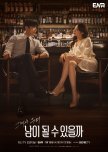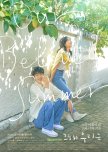
Can I Be Someone Else
65 personnes ont trouvé cette critique utile
Cette critique peut contenir des spoilers
A wasted premise
[UPDATED] As a Jang Seung-jo fan, I was desperate for "Strangers Again" to work. I ignored all the misfires and the lapses in logic and stayed with it until the 12th episode. But when the ending rolled in, I realized that there was a basic flaw in the character development of the leads.I don't mind flawed characters. I especially love flawed characters who grow stronger in the broken places. The male lead started out well enough as a divorced divorce lawyer whose life is a mess. His ex-wife is also a divorce lawyer who seems to have come out feistier and richer. All the ironies were in place.
But no, after laying a solid foundation for what could have been a smart commentary on life, love and career, "Strangers Again" proceeds to self-destruct.
Jang Seung-jo's Eun-beom is so badly drawn, I suspect he was written as a plot device for Ha-ra's journey. His characterization is utterly illogical: a formidable intellect in court, he doesn't make sense in everyday life. He loves Ha-ra but concocts a hare-brained scheme to break-up his marriage, sets up his ex with his best friend so he stops paying alimony, never told her about his childhood traumas while she was his wife, and turns out to be a serial relationship killer. His redemption is a short footnote in the last episode via a Google search and a trip to the therapist's office. The writer was not interested in his evolution – only the havoc he creates.
Kang So-ra's character Ha-ra is better fleshed-out and is obviously the real center of the series: she may be cut-throat in court but she's not unscrupulous, she genuinely wants to help her clients, and in turn learns life's valuable lessons from them. She not only gets the best lines in terms of self-discovery, she also gets the best meltdowns.
The second leads' story trajectory is hands down the better romance in this series. From irritating characters, the liberated noona and the political conservative blossom into relatable characters as they learn to own up to their mistakes, communicate, and compromise.
Hyperrealism is no excuse for bad storytelling. I want characters with depth whose motivations are well-established. I want a plot that makes sense, even if it is imitating life.
Law practice, love, and divorce are potent ingredients that could've given us an unforgettable series – that's the wasted premise. I was expecting a Matryoshka doll with layers of meanings. Instead I got Barbie and Ken in power suits who are trapped in their own drama.
Cet avis était-il utile?

Cette critique peut contenir des spoilers
Food for the heart, food for the soul
"Our Beloved Summer" is HOW a slow-burn, romance drama should be done. It sunk its emotional hooks into my heart and never let go – and remains my bar for a good drama of this genre. The writing is thoughtful and witty, the acting is nuanced, the language of love is conveyed through beautiful cinematography instead of endless prattle, but the best part is what's under the hood.
Using the reality documentary as a narrative tool, the story of Choi Woong (Choi Woo-shik) and Kook Yeon-soo (Kim Da-mi) comes to life through this unique lens. It grounds this love story squarely in the age of digital and connects it to a young demographic.
It's roughly divided into 3 phases: the puppy love of teenagers, the tumultuous and tortured relationship of twenty somethings, and the hard realities of professionals dealing with career and adulthood. But there's another invisible division to the storyline: on-cam and off-cam. The docu cam follows them all throughout capturing the milestones of the couples' lives. Off cam, the storytelling becomes more eloquent, telling us what REALLY happens BTS.
In an age when most K-dramas are mindless time-sucks, "Our Beloved Summer" is a worthy investment in time. It offers so much more to deconstruct than just relationships. its about growing up. It's about the dumb luck of success and failure that happens despite your laziness or hard work. It's about vulnerability and art. It's about the futility of ambition in a career-obsessed society. It's about how loving adopted parents trump a biological father who chickens out.
The documentary narrative tool also gives viewers the BEST ending I've seen in a while in a K-drama with that garden scene where it's stated that they've gotten married (thank God no marching-down-the-aisle scene) and it's time for the next installment of their reality show.
Here are the other things I love about this series:
• Best acting by far by a male and female lead – and at this point, I've watched a lot. Choi Woo-shik IS Woong – his subtle acting makes a loser character lovable and multi-dimensional, while Kim Da-mi pulls off the hard feat of making an obnoxious character like Yeon-soo relatable, even sympathy-worthy. In the end, I understood her, even though she is the most flawed character in the series and the main source of heartache. I am also surprised that I didn’t hate the dominant-woman/weak-man dynamic of the lovers – while I love strong women leads, I hate irrational ones – and Yeon-soo can be irrational. And until Woong, I have never empathized with a weak, spoiled male lead, let alone stay with him on his journey to finding his passion. I guess that’s a testament to Woo-shik’s superb acting.
• In terms of pacing, I wasn’t bored by this – the dialogue was mostly fast-paced with only a few lags. But it still cements my view that romances, no matter how well directed or scripted, are stretched at 16 episodes at 1 hour each. Even this gem of a script lags a little in the middle like that forced vacation in a secluded mountain resort. Still, that episode redeemed itself with the bicycle scene and that heart-wrenching kiss-in-the-rain hilltop shot that is simply gorgeous.
• The love triangle is so well-crafted and so well-interwoven my heart bleeds for the other Woong (Kim Ji-woong). Despite the fact that he’s hot and the physical opposite of Woo-shik's character, it’s clear why the female lead fell for Choi Woong – he oozes brooding charm and vulnerability, and complements her like water to fire.
• The sub-plot of Ji-woong’s mom is the only unsatisfactory storyline for me, but that’s a minor complaint.
• Kudos to the scriptwriter that the subplot of the second love triangle featuring the girl idol doesn't deteriorate into hackneyed. (Her story even manages to make a statement on cancel culture.) Even the "confrontation" scenes between this character and the female lead are sad but not sappy and circumvents the cliche of fighting females.
• I am thankful the showrunners did not belabor the LDR – no tired drama there, just mature people dealing with distance.
• The adoptive parents and grandmother are so well-scripted and cast: folksy-smart, angelic, loud or sharp-tongued at times, and never one-dimensional the way peripheral characters go. Even the subplot of Woong's biological father hanging around him skirted the usual melodrama.
Over-all, "Our Beloved Summer" is epic in its ambition to tell an intelligent urban love story through nearly three decades. And it succeeds in delivering the swoons (because in the end that's why we watch romances, right?) without the guilt of saccharine trope.
Cet avis était-il utile?


